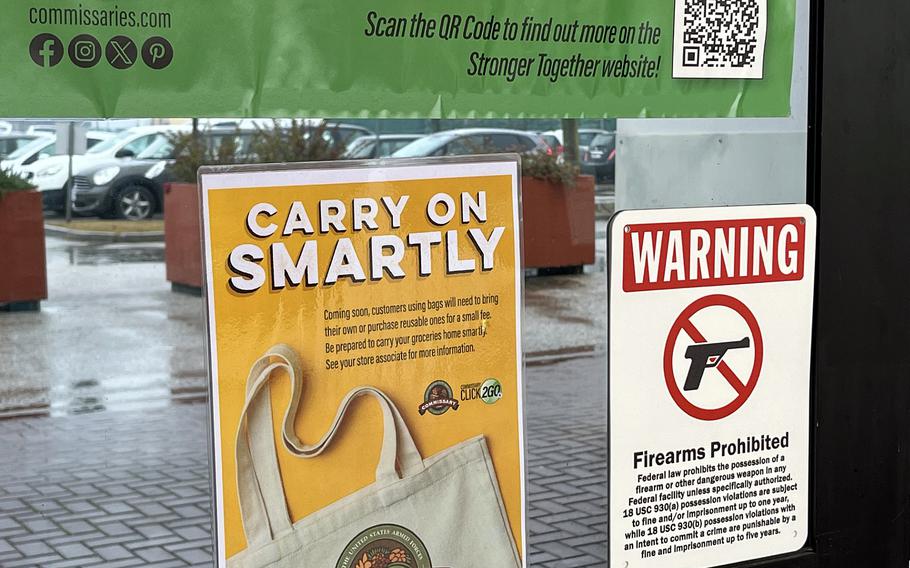Europe
Commissaries in Europe will stop providing single-use grocery bags in coming weeks
Stars and Stripes January 8, 2025

Reusable bags will be available at base commissaries for a small fee as the Defense Commissary Agency phases out single-use plastic bags in Europe. (Rebecca Holland/Stars and Stripes)
VICENZA, Italy — Commissary shoppers in Europe will soon have to bring their own bags or purchase a reusable option as base grocery stores progressively phase out single-use plastic bags this month.
The commissary in Naples, Italy, announced recently on Facebook that stores around Europe will move to reusable bags starting in mid-January. About 450 miles to the northeast at the Army’s base in Vicenza, a sign at the commissary entrance tells customers to be prepared for the transition.
At Ramstein Air Base in Germany, which hosts the largest commissary in an area serving tens of thousands of U.S. personnel and their families, single-use bags were still available Wednesday.
The commissary is using its final pallet of disposable bags and is expected to run out during the week of Jan. 20, said a commissary official, who spoke on condition of anonymity because they didn’t have immediate authorization to talk about the matter.
Customers will have the option of bringing their own bags or purchasing from an assortment. Recyclable, biodegradable plastic bags that workers say should last about five uses will cost 9 cents, and a large paper bag with handles will be 14 cents.

Shoppers at commissaries in Europe will have to purchase a reusable or recyclable bag, or bring their own bag, starting later in January 2025. (Rebecca Holland/Stars and Stripes)
Prices on stronger, reusable bags range from around 50 cents to $5 depending on the bag style, according to the Naples commissary.
A few miles from Ramstein at the Vogelweh commissary, workers said they expected the free bags to run out by the end of the month. The store had some thermal plastic bags on sale but none of the new bags yet.
Shoppers outside the Vogelweh store on Wednesday had mixed opinions on the change.
“I think it’s a great idea,” Emily Stinson said. “If you’ve never had to use reusable bags before, changing the habit of using bags over and over is going to be difficult. But I think it’s very good for the environment.”
It’s an especially good idea in Germany because it aligns the U.S. community with the rest of the country, which doesn’t use disposable grocery bags, said Jasper Hughes. It’s a bad look for Americans to bring their pollution with them, Hughes said.
“I don’t think it’s necessarily an inconvenience,” he said. “When I go out in town, I’m very conscious about it.”
Bryce Lacroix agreed that the shift to reusable bags was good but took issue with paying for them given the effect of inflation on paychecks.
“We’re already in the military, so why are we paying for bags?” Lacroix said. “When you come on base, it should be different. There should be more benefits.”
The move away from plastic bags is part of a push to meet European Union regulations and promote environmental sustainability in the U.S. military’s retail system, officials told Stars and Stripes last year.
Commissaries in Guam, California and Hawaii have already phased out plastic bags to comply with local and state regulations.
Last year, Yokosuka Naval Base in Japan announced it would eliminate plastic bags, before reversing course a few months later.